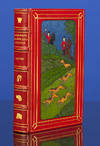

Nuclear Configurations in the Spin-Orbit Coupling Model I. Empirical Evidence WITH Nuclear Configurations in the Spin Orbit Coupling Model II. Theoretical Considerations in Physical Review 78 No. 1, April 1, 1950, p. 16-21 and pp. 22-23 FULL VOLUME
by Mayer, Marcia Goeppert
- Used
- first
- Condition
- See description
- Seller
-
West Branch, Iowa, United States
Payment Methods Accepted
About This Item
Lancaster: American Institute of Physics, 1950. 1st Edition. BOUND FIRST EDITION OF THE TWO PAPERS IN WHICH MARCIA MAYER DEVELOPS A MATHEMATICAL MODEL FOR THE STRUCTURE OF NUCLEAR SHELLS. Mayer "was the first person to investigate the theoretical basis of nuclear pairing," something which plays a critical role in the shell model of the atomic nucleus. Along with J.H.D. Jenson and Eugene Wigner (for their contributions to the theory of the atomic nucleus and nuclear shell structure), Mayer won the 1963 Nobel Prize in Physics for this work.
"Mayer was a mathematical physicist with a facility for the matrix manipulations of group theory and quantum mechanics and a chemist's appreciation for the accumulation and analysis of large quantities of physical data" (Dictionary of Scientific Biography). In 1950, there were two major theories of the nucleus: the liquid drop model and the shell model. "The reality of some kind of shell arrangement became clear only in 1948, when Mayer [in this paper] brought together evidence from diverse fields that showed the reality of what soon became known as ‘magical numbers.' The name seems to have been coined by Wigner. Mayer argues persuasively that nuclei with 2, 8, 20, 50, 82, and 126 protons or neutrons were particularly stable and hence that these magical numbers represented closed shells in the nucleus. Not only did these nuclei have large binding energies and the largest number of isotopes, but they were also markedly more abundant than nuclei in their neighborhood" (Kragh, Quantum Generations, p. 280).
Interestingly it was "Enrico Fermi who provided Mayer with a critical insight by asking her: ‘Is there any indication of spin orbit coupling?' She realized that this was indeed the case, and postulated that the nucleus is a series of closed shells and pairs of neutrons and protons tend to couple together" (Wikipedia). CONDITION & DETAILS: Lancaster: American Institute of Physics. 4to. Well scuffed at the spine, otherwise tight and clean.
"Mayer was a mathematical physicist with a facility for the matrix manipulations of group theory and quantum mechanics and a chemist's appreciation for the accumulation and analysis of large quantities of physical data" (Dictionary of Scientific Biography). In 1950, there were two major theories of the nucleus: the liquid drop model and the shell model. "The reality of some kind of shell arrangement became clear only in 1948, when Mayer [in this paper] brought together evidence from diverse fields that showed the reality of what soon became known as ‘magical numbers.' The name seems to have been coined by Wigner. Mayer argues persuasively that nuclei with 2, 8, 20, 50, 82, and 126 protons or neutrons were particularly stable and hence that these magical numbers represented closed shells in the nucleus. Not only did these nuclei have large binding energies and the largest number of isotopes, but they were also markedly more abundant than nuclei in their neighborhood" (Kragh, Quantum Generations, p. 280).
Interestingly it was "Enrico Fermi who provided Mayer with a critical insight by asking her: ‘Is there any indication of spin orbit coupling?' She realized that this was indeed the case, and postulated that the nucleus is a series of closed shells and pairs of neutrons and protons tend to couple together" (Wikipedia). CONDITION & DETAILS: Lancaster: American Institute of Physics. 4to. Well scuffed at the spine, otherwise tight and clean.
Reviews
(Log in or Create an Account first!)
Details
- Bookseller
- Atticus Rare Books
(US)
- Bookseller's Inventory #
- 1598
- Title
- Nuclear Configurations in the Spin-Orbit Coupling Model I. Empirical Evidence WITH Nuclear Configurations in the Spin Orbit Coupling Model II. Theoretical Considerations in Physical Review 78 No. 1, April 1, 1950, p. 16-21 and pp. 22-23 FULL VOLUME
- Author
- Mayer, Marcia Goeppert
- Book Condition
- Used
- Quantity Available
- 1
- Edition
- 1st Edition
- Publisher
- American Institute of Physics
- Place of Publication
- Lancaster
- Date Published
- 1950
Terms of Sale
Atticus Rare Books
30 day return guarantee, with full refund including shipping costs for up to 30 days after delivery if an item arrives misdescribed or damaged.
About the Seller
Atticus Rare Books
Biblio member since 2010
West Branch, Iowa
About Atticus Rare Books
We specialize in rare and unusual antiquarian books in the sciences and the history of science. Additionally, we specialize in 20th century physics, mathematics, and astronomy.
Glossary
Some terminology that may be used in this description includes:
- Tight
- Used to mean that the binding of a book has not been overly loosened by frequent use.
- Spine
- The outer portion of a book which covers the actual binding. The spine usually faces outward when a book is placed on a shelf....
- First Edition
- In book collecting, the first edition is the earliest published form of a book. A book may have more than one first edition in...

